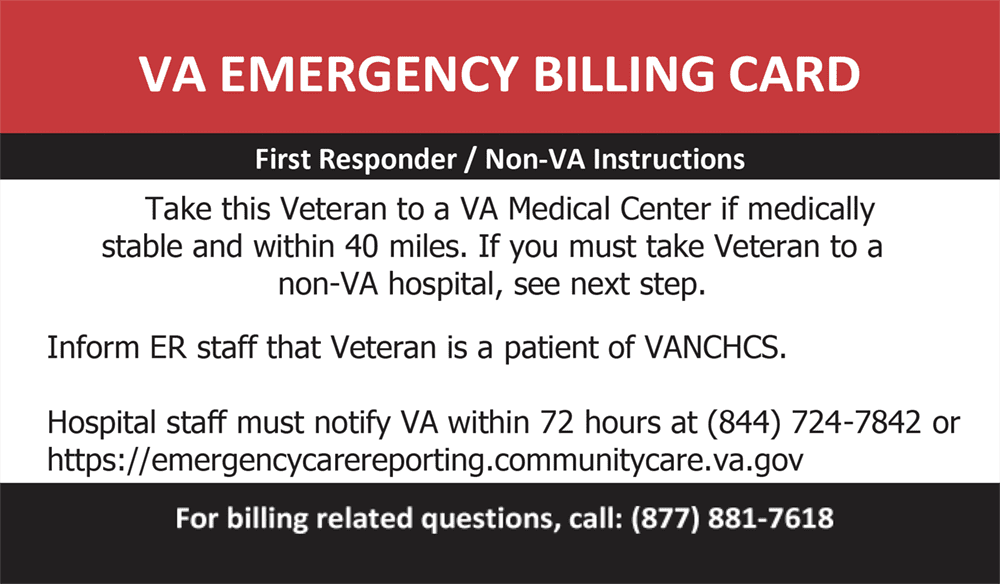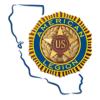
If you receive your medical care through the VA Northern California Healthcare System (VANCHCS), you can now obtain a Non-VA Emergency Medical Card and instructional brochure from the Patient Advocate Office or Eligibility/Enrollment Dept. of the VA medical facility where you are enrolled.
Patients of any VA facility can print out their own card by downloading it here.
This card will help you avoid having to pay your emergency medical bills in the event you are taken by EMTs to the nearest non-VA trauma center. The card IDs you as a veteran and instructs EMTs, hospital, ER doctors, and radiologist as to what they must do, where to send their bills to the VA and not to you.
The brochure gives instructions to care-givers, spouses and other family members to notify the VA within 72 hours of receiving medical care. The medical emergency should be reported by calling (844) 724-7842 or visiting https://emergencycarereporting.communitycare.va.gov.
Both the card and brochure are now available by calling your patient advocates in Auburn, Chico, Fairfield, Mare Island, Martinez, McLellan, Oakland, Redding/ Yreka, Sacramento, VAMC and Yuba City.
The need for the card and instructional brochure was brought to the attention of the hospital assistant director and department managers at Sacramento VA Medical Center at Mather by a member of American Legion Sacramento Legislative Action Post 861.
The assistant director and managers were deeply moved when they listened for 20 minutes while the veteran told of his two-year battle with VA over its refusal to pay for any medical bills related to a perceived medical emergency because he didn’t follow all the step-by-step requirements. Like most veterans, he had no prior knowledge of what he or his family needed to do.
Also, the veteran learned that the VA expects veterans and family members to be expert diagnosticians. If you are taken to a non-VA trauma center when you or another person think you are in serious condition and then the ER doctor determines your extreme chills and difficulty breathing were due to a severe case of the flu, the VA will likely deny your claim because someone in their billing department decides it wasn’t a true emergency.
In this veteran’s case, he was being withdrawn from prednisone by his allergist/immunologist and rheumatologist after being on it for 11 years. Due to concern over a possible adrenal crisis, the specialist advised the veteran to take prednisone and call 911 if he became ill, which he did. The non-VA ER doctor’s diagnosis was that the veteran had flu. The VA denied his claim.
After two years of frustration and his credit, the veteran appealed to Representative Doris Matsui, who intervened, and the VA immediately paid all bills. The veteran learned from a patient advocate while the card was being developed, that she was aware of two veterans who committed suicide over going through a similar experience. It destroyed their lives.
Most certainly, there are many veterans in California and across the country, who have had similar negative experiences. The Non-VA Emergency Medical Card and brochure will help prevent this from happening to you. Please get the word out to your VSOs that these cards and brochures are now available in VANCHCS. In addition to arming yourself with the Non-VA Emergency Medical Card and instructional brochure, you need to know what medical people consider to be medical emergencies, so you don’t get taken to a non-VA trauma center for a non-life-threatening condition.
Two excellent sources are from the College of Emergency Physicians, and The Mayo Clinic. Also, a letter from your VA doctor instructing you to call 911 under specific conditions will be helpful in the event the VA refuses to pay your bills. Keep a record of everything.
IT IS VITALLY IMPORTANT that you position your card in your wallet opposite your driver’s license so the police/EMT’s will see it in the event you are unconscious. They will want to ID you and will immediately look for your driver’s license. Print a copy of the card for your spouse (or others) to keep in his/her wallet/purse. Secure the brochure to your refrigerator door with a magnet.
How do I know that everything that I’ve told you is accurate and true? I am the veteran who experienced it first-hand.














I am the father of a VA patient I took to the Shasta Regional Hospital. Not knowing about this notification requirement, he was filed as a general patient. When discharged to Rehab, with a possible heart blockage, he was placed in a NON VA care facility, l took him to the hospital on 29 November 20211 where he was analyzed for two weeks and then discharged to Copper Ridge, a non VA connected care facility where he still is on the 24th of November 2022… (He had been in the same hospital previously for similar problems. I would think they should have connected to vA during the admittance. I have spent thousnds and contacted many in VA as well as in the general area.
Now I am trying to get a statement as to what care is needed to let him go b ack to his homeless than 2 miles from the presesnt care facility.
DOES ANYONE HAVE ANY QUESTIONS OR SUGGESTIONS.L hE WALKS ON HIS OWN AND IS IN RELATIVE GOOD CONDITION WITH SOME HELP NEEDED.
Hello James,
I would suggest you visit our Veterans Service Officer web page. (https://calegion.org/vso/) There you can find contact information for our Department of Califonia Veterans Service Officer in your area. They may be able to give you a hand.
For God and Country,
Rick Pushies
Department Web Team
805-925-9144
Dear Ernst Larson, Jr,
Thank you for sharing your story and this information. It will help so many! Knowing to call the VA Notification number you listed helped our family, too…
My husband’s recent ambulance trip to the local ER, just 2.7 miles away, was $2001!
Although we have health insurance through his Federal employment, he was also enrolled in the VA Healthcare system due to his service-connected disabilities.
A perk to being enrolled in the VA Healthcare system is that, similar to AAA Auto Club’s membership’s service calls, enrollees in VA Healthcare are allowed 3 VA-billable trips to an ER (whether to a VA ER, or one from the regional VA’s approved list if the enrollee is too far from a VA ER), and 3 VA-billable trips to an Urgent Care (same stipulations as an ER trip)
The trip does not have to be related to the enrollee’s service-connected disabilities – but a trip that meets the criteria described in your article.
Knowing to call the VA’s “Notification” phone number to notify them within 72 hours of your ambulance trip including sharing details of the incident and getting the “Incident Notification number” – the LONG number that the VA phone rep will give you- is also important!
That long VA Notification number is what you’ll share with the ER hospital’s Billing Dept, as well as your other insurance provider, so they’ll know to bill the VA, and not YOU or your other insurance, for your ambulance trip.
As always with the government bureaucracy, there are some exclusions, so ask the VA Phone Rep about them when you call.
In the least, your VA Notification Number might be able to be used as a secondary payer, after your other medical insurance has paid their allowed part, to pay that insurance’s required co-payment for the ambulance trip (usually an out-of-pocket expense!) which could be $300-$500.
Thank you also, Ernst, for providing links to read further about this for details and clarifications.
Q: What about veterans who are NOT in northern California, but are mid-state or in SoCal? Is there a card for US to use? and where can we get it?
Gratefully,
Desirae S.